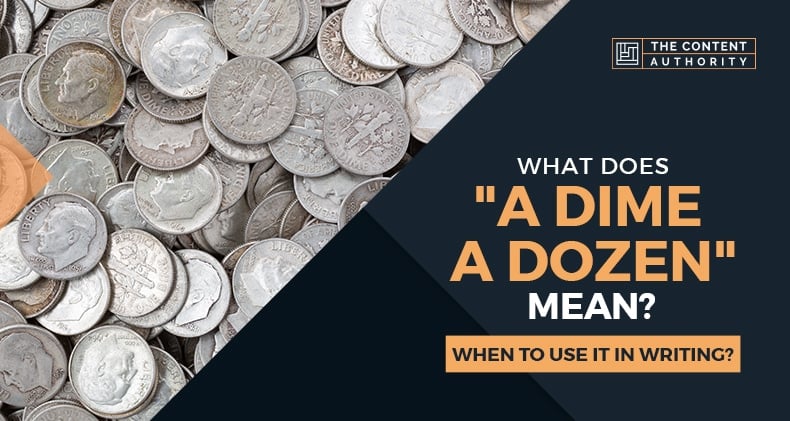Whether you’re just learning English for the first time or you’ve been speaking it all your life there will come a point when you realize that there are a lot of idioms being used. This is because the English language that we use frequently has a figurative meaning to it. Understanding this meaning is important if you truly want to understand what someone is trying to tell you.
The phrase “a dime a dozen” dates as far back as the 1800s. At this time in the United States, things like eggs and apples were advertised to cost a dime a dozen. Over the years this phrase has come to mean that something is so plentiful that it has no value or it’s so common it’s almost worthless.
Meaning of the Phrase
When you say that something is “a dime a dozen” you’re saying that there’s so much of the item available that it no longer holds any value. In other words, the item is so common, plentiful, or abundant that you can now get it for a very cheap price. You can think of the item as being easily acquired.
There are a lot of synonyms that you can use in place of this phrase including:
- superabundant
- ordinary
- commonplace
- common
- everyday
- routine
- usual
- familiar
- ubiquitous
- household
What you aren’t trying to say is that the item is abnormal, irregular, unnatural, extraordinary, infrequent, rare, seldom, uncommon, unfamiliar, or unusual.

Similar Idioms
You should note that the phrase “a dime a dozen” isn’t the same as another American idiom which has a much newer origin. Today there are a lot of people who say something is a “dime” when they’re referring to an informal rating system because the number 10 is considered a very desirable number. Therefore when people say something is a “dime” they’re saying it’s rated at the top of the scale (e.g. a person is a dime meaning they’re a perfect 10 in terms of attractiveness).
Some other idioms that include the word “dime” are:
- “Dime novels”: Cheap paperback novels that were popular at the beginning of the 1900s.
- “Dime store” (a.k.a. “five and dime”) A store that was popular in the late 1920s which sold various items that cost 5 – 10 cents
- “Turn on a dime”: To change directions almost immediately
- “Stop on a dime”: To stop almost immediately
Origin of the Idiom
In 1786 the dime was declared America’s 10-cent coin by the Continental Congress. They were the legislative body that met in the British American colonies before, during, and after the American Revolution. According to them, the coin was worth one-tenth of the United States dollar. They derived the word “dime” from the Latin word “Decimus” meaning “one-tenth.” The French also used the word ‘disme’ (eventually “dime”) to indicate the same monetary value.
The first dime (as we know it today) was minted in 1796. This is why some people believe that it was after 1796 when this phrase actually originated. Some say that it was probably during the 1800s because it was in this century that a variety of newspapers ran ads saying that some grocers were selling food that was literally priced at “a dime a dozen.” For instance, in 1866 the Galveston Daily News is quoted as saying, “The San Antonio Ledger says the city is well stocked with peaches at a dime a dozen.”
The foods that typically sold for this price consisted of things like eggs, peaches, and oranges. At the same time, it’s important to understand that a dime was more valuable then than it is today. Nevertheless, it still sounds as though people were getting a good deal.
It wasn’t until the early 1900s that people started using this phrase figuratively though. When they’d use it they’d mean that something was common and thus it was less valuable. For instance, in 1931 The Northern Miner newspaper is quoted as saying “‘Carners,’ the old-timer said, ‘is just an overgrown clown. As for the others–Schaof, Baer, Paulino, Risko, Campolo–they’re nothing but ‘dime a dozen fighters.'”
There’s some evidence that this phrase continued to be used both figuratively and literally because in 1937 we see the Sandusky Register using it literally. Here they’re quoted as saying “Smiles were a dime a dozen in the Yankee clubhouse. Even Colonel Ruppert, owner of the club, was so stated he went from player to player shaking hands.”

Using the Idiom
When you say that something is “a dime a dozen” you can be referring to either a thing or a person. This is because the word “dime” doesn’t always mean that the subject is cheap or inexpensive. Remember, this can also be used in saying that the subject is plentiful. It’s also possible to imply that something is cheap but this is never the case when a person is the subject of the phrase.
Since there’s such a diverse meaning behind this phrase it’s possible to use it in a lot of different situations. There simply needs to be something present that the person who’s using the phrase feels is either common or doesn’t hold much value. Of course, what this object is will be dependent upon how the person who’s using the phrase perceives the world. This is why it’s possible to have a disagreement in regards to this phrase: While someone may think that something is “a dime a dozen,” someone else may disagree with their perception of the item.
When to Use the Idiom
This is a phrase that can also be used in different kinds of companies. However, you’ll find that oftentimes it’s easier to use this phrase among friends and family members with whom you’re able to speak openly. This is because then you don’t need to worry about impressing these people or maintaining a professional demeanor.
Many times it’s considered inappropriate to use idioms in professional settings. However, it’s relatively easy to imagine how you could use “a dime a dozen” in a more formal setting (e.g. a business meeting). For instance, one of your colleagues may use the phrase to refer to how common a product is or even how typical it is for someone to have a specific skill.
Why Use This Idiom
Writers will use “a dime a dozen” in the same way and for the same reason that anyone who speaks the phrase out loud uses it. However, you should know that when an idiom is native to a specific region it does reveal something about the person who uses it and those who are able to understand what’s being said. In fact, this is a great way to show a person’s characteristics without describing them in words. It also shows how this person is able to understand the world. For instance, when someone uses a unique idiom that a reader hasn’t heard before it may be ascertained that the person is from a secluded region in the world that isn’t in the literary spotlight very frequently. On the other hand, if a character uses a widely used idiom like “a dime a dozen” it shows that they’re more like the reader. It’s important to use caution when using this literary method though because while they can be helpful they can also make a dialogue so cluttered that it’s difficult to understand.
The Idiom in Popular Culture
The idiom “a dime a dozen” is such a common part of popular culture today that it’s been found in several movies including:
- In 1985 in “Death of a Salesman” Biff Loman (played by John Malkovich) says “Pop, I’m a dime a dozen and so are you.”
- In 2008 in “Street Kings” Captain Jack Wander (played by Forest Whitaker) says “They’re a dime a dozen. You… you, man. You’re special. You’re special to me.”
- In 2006 in “Superman Returns” Lex Luthor (played by Kevin Spacey) says “You can print money, manufacture diamonds, and people are a dime a dozen, but they’ll always need land. It’s the one thing they’re not making any more of.”

Example Sentences
Whether you want to be “cool” like one of these actors or you simply find yourself being able to use this phrase in some way, here are some examples of sentences wherein it’s appropriate to say “a dime a dozen:”
- As a savvy shopper, I find that deals are a dime a dozen.
- You’ll find that these stores are a dime a dozen in our city.
- Unfortunately, cheap watches have flooded the marketplace so badly today that they’re now a dime a dozen.
- Don’t worry if you forget your beach towel. You’ll find they’re a dime a dozen.
- Small-time local bands are a dime a dozen as many youths form them in hopes of making it big someday.
- That type of TV show is now a dime a dozen.
English Idioms
Conclusion
The next time you find something unordinary that you want to remark about, remember the phrase “a dime a dozen.” Doing so will enable you to use the phrase and spice up your conversation a bit.
Shawn Manaher is the founder and CEO of The Content Authority. He’s one part content manager, one part writing ninja organizer, and two parts leader of top content creators. You don’t even want to know what he calls pancakes.

